N. Bagdasar despre teoria blagiană a cunoașterii
N. Bagdasar on Blaga’s theory of knowledge
Author(s): Eugeniu NistorSubject(s): Metaphysics, Contemporary Philosophy
Published by: Editura Academiei Române
Keywords: dogmatic method; mystery; paradisiacal knowledge; luciferic knowledge; metaphysical paradoxes;
Summary/Abstract: N. Bagdasar approaches Lucian Blaga’s writings on the theory of knowledge in the first section of the volume “History of Romanian Philosophy” (1940), subtitled “Pure Philosophy”, where he tackles issues regarding logic, epistemology and metaphysics. After a brief biobibliographical presentation, in which he remarks, among other things, that he is “endowed with the most constructive head and a special fecundity”, the exegete exposes objectively the main concepts of knowledge, starting with the original methodology of Blaga, with dogmatic meaning, emphasising the distinction between dogma and transfigured paradoxes, between the enstatic and ecstatic intellect, referring, in detail, to the mystery as a working object of understanding knowledge, to the two types of knowledge: paradisiacal and luciferic, insisting on “articulated” possibilities of the latter: plus-knowledge, zero-knowledge and minus-knowledge. All these types of knowledge, to which others are added, “juxtaposed” (such as mythical and occult knowledge), are “modes” of individual knowledge, under the control of the unseen center of the world represented by the Great Anonymous who, to ensure “existential balance”, limits the possibilities of human knowledge by applying transcendent censorship.
Journal: Revista de filosofie
- Issue Year: LXVIII/2021
- Issue No: 5
- Page Range: 597-614
- Page Count: 18
- Language: Romanian

